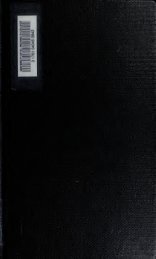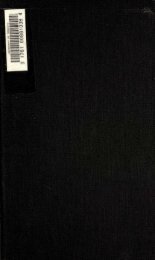Texts from the Buddhist canon : commonly known as Dhammapada
Texts from the Buddhist canon : commonly known as Dhammapada
Texts from the Buddhist canon : commonly known as Dhammapada
You also want an ePaper? Increase the reach of your titles
YUMPU automatically turns print PDFs into web optimized ePapers that Google loves.
i63 )<br />
SECTION. XXXV.<br />
THE BKAHMAChIeIN.<br />
In days of old, in a certain mountain (called Sse-yaucliu-to)<br />
in <strong>the</strong> country of Saketa (Sse-ho-teh), <strong>the</strong>re were<br />
resident some 500 Brahmans who pretended to have<br />
arrived at final rele<strong>as</strong>e (Nirv§,na), in consideration of <strong>the</strong>ir<br />
miraculous powers (irrdhi). Now at this time Buddha,<br />
having just arrived at complete enlightenment, and hegin-<br />
ning to sound <strong>the</strong> drum of <strong>the</strong> law, and open <strong>the</strong> doors of<br />
immortality, w<strong>as</strong> induced, on account of <strong>the</strong>se Brahma-<br />
charins, to come into <strong>the</strong>ir neighbourhood, and sitting<br />
beneath a tree, to reveal <strong>the</strong> splendour of his person,<br />
iifter some conversation with <strong>the</strong>m, he repeated <strong>the</strong>se<br />
verses<br />
:<br />
" Stem <strong>the</strong> stream and p<strong>as</strong>s over, without desixe<br />
<strong>as</strong> a Brahman !<br />
Understanding <strong>the</strong> end of all that<br />
is made (or, of all modes of conduct), this is t^ruly<br />
named (<strong>the</strong> life of a) Brahmachirin.^ In (or, by<br />
means of) <strong>the</strong> two laws of nothingness,^ pure and-<br />
spotless p<strong>as</strong>sing over <strong>the</strong> gulf, c<strong>as</strong>ting off all <strong>the</strong><br />
bonds of desire, this is to be a Brahmachdrin (in-<br />
deed). It is not by his clan, or his platted hair,<br />
that a man is called a Brahman, but he who walks<br />
truthfully and righteously, he is indeed rightly<br />
called a good man (Bhadra), What avails <strong>the</strong><br />
1 The reader will observe <strong>the</strong> similarity of <strong>the</strong> P&li version, vers. 383; &o.<br />
2 The sense appears to be " regarding both this world ^nd <strong>the</strong> o<strong>the</strong>r <strong>as</strong><br />
nothing." Compare <strong>the</strong> Pali o«-apdm.





